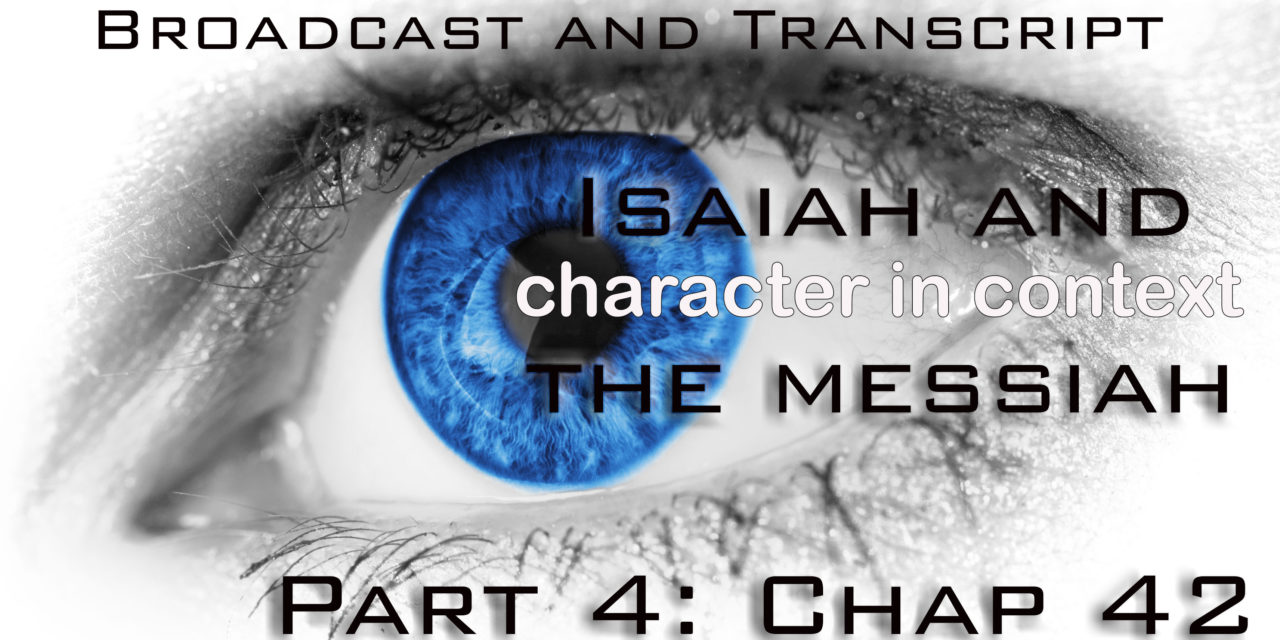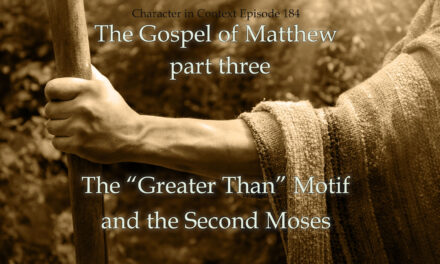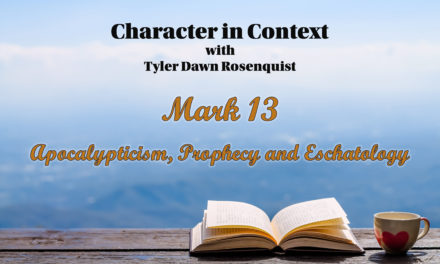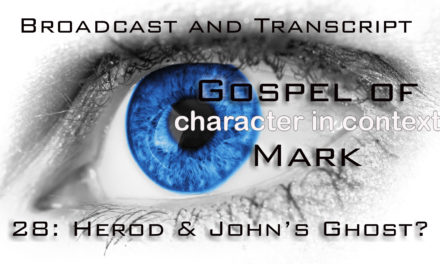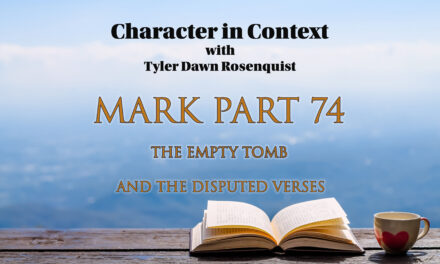This week we will be covering Isaiah chapter 42, where we will be introduced to the one whom Rabbi David Kimchi, Abarbanel and two of the Targums identify as the Messiah. This is a clear allusion to Yeshua/Jesus as the idealized version of Israel as servant–neither blind nor deaf nor rebellious nor violent toward the oppressed, but a bringer of the Law to the ends of the earth. Exciting stuff!
Transcript below, just barely edited–so just ignore any grammar and spelling mistakes please.
hey there! This is part three of my series on Isaiah and the Messiah. Last week week we entered into the disputation, the beginning of the courtroom drama where God challenged the people of the nations and their gods to sit in court with Him and be judged as to who is and is not all-powerful, who can foretell future events AND make them happen, and who can do the impossible—namely, bring back a nation from exile, into their own land, without them rising up in revolt or by actually doing much of anything to make it happen. It is also a message that continues the theme of comfort and promise. It is spoken to a people who have been beaten down by almost seventy years of exile in the Babylonian Empire, who have come to wonder whether or not God is even there anymore, whether He wants to rescue them or even can anymore given the ancient Near Eastern belief that when a country is conquered and a Temple destroyed, that the God/gods of that country are also defeated and destroyed. Did Yahweh survive the destruction of Jerusalem and Judah? Is he able to save? Does He want to save? How will He save?
We are covering this because the Gospel of Mark explores the ministry of Yeshua/Jesus from the unique vantage point of being a fulfillment of his “way discourse” aka the “Isaianic New Exodus” and if we don’t know chapters 40-55 of Isaiah, so much of the beauty of Mark is lost. Also, as this section of Isaiah is misused by anti-missionaries in order to undermine faith in Yeshua, covering it verse by verse in the original context, I hope, will protect people from being deceived.
Hi, I am Tyler Dawn Rosenquist and welcome to Character in Context, where I teach the historical and ancient sociological context of Scripture with an eye to developing the character of Messiah. If you prefer written material, I have five years worth of blog at theancientbridge.com as well as my six books available on amazon—including a four-volume curriculum series dedicated to teaching Scriptural context in a way that even kids can understand it, called Context for Kids—and I have two video channels on youtube with free Bible teachings for both adults and kids. You can find the link for those on my website. Past broadcasts of this program can be found at characterincontext.podbean.com.
All Scripture this week is taken from the ESV, the English Standard Version, because that is what my interlinear is in. And unlike my usual MO, I will be saying Yahweh instead of God and Lord because there are so many different voices speaking back and forth in Isaiah 40-55 that it will help eliminate confusion. Otherwise, I always use titles because I don’t like to use His name carelessly or casually. Just a personal preference.
Over the last three weeks, we have been introduced to a number of different characters who are speaking and being spoken about. Obviously Yahweh is the first and most prominent voice, followed by the emergence of an anonymous voice who I call “heavenly council member #1” followed by the prophet Isaiah, then another anonymous council member. That was Is 40 and in Isaiah 41, last week, we were introduced to the nations, who only spoke to one another in the background as they tried to subvert the plans of Yahweh, and to the warrior “servant” who will be identified later as King Cyrus of Persia who does not arise until 150 years after the events of Is 39.
So let’s get on with it! Yahweh is speaking here and will continue through verse nine:
2 Behold my servant, whom I uphold, my chosen, in whom my soul delights; I have put my Spirit upon him; he will bring forth justice to the nations.
But, you know, there were no chapters when the Bible was written, so why is Yahweh saying, “Behold my servant” here—because it isn’t out of nowhere. When we left off last week, Yahweh had just verbally laid into the nations because their representatives, their gods, were powerless, empty, nothing. They had nothing with which to counter Yahweh’s plans to set His people free from exile, their plans were irrelevant. It’s like He was saying, “Okay, your representatives are nothing, but behold, my servant…BOOM…here’s what my servant (abdi, singular, personal possession) is and what my servant will do. First of all, I will uphold him, maintain him—and he is my chosen and my soul delights in him.”
Sideline here—targums Codex Reuchlinianus and Codex Nuremberg, as well as both David Kimchi (12/13th century) and Abarbanel (15th century), deeply respected Jewish Biblical scholars, all identify the servant in Is 42:1 here as the Messiah. The targums, of course, were Jewish authored Aramaic paraphrases of the Bible which were read in synagogues and fall, timeline-wise, between the Septuagint (3rd century BCE) and the Masoretic text (8th century CE) of the Hebrew Scriptures that we use today. The targums show us how Jews of the first century generally interpreted the Scripture, and they can have some pretty wild stuff in them and some of them violently disagree with one another because that is the nature of commentary.
of course, Matthew the Gospel author would agree as he used this verse to describe Yeshua’s baptism
Matt 3: 16 And when Jesus was baptized, immediately he went up from the water, and behold, the heavens were opened to him, and he saw the Spirit of God descending like a dove and coming to rest on him; 17 and behold, a voice from heaven said, “This is my beloved Son, with whom I am well pleased.”
And I want to point something out here, and I will re-emphasize this every week. And I got this clarity from a brilliant scholar named Ben Worthington III. There is this idea floating around out there that the Apostles used Isaiah in order to justify what they believed but I disagree. I believe that they found in Isaiah an explanation for what they had experienced firsthand. Like, when Yeshua finally ascended to the Father, they were like, “what the heck just happened,” and they went and searched the Scripture and read Isaiah and they were like, “oh dang, heck yeah, I see it now.”
Continuing on with the verse, after “I will put my Spirit on him” it reads “he will bring forth justice to the nations.” Mishpat—right rulings, an ordered and right way of living, justice to the oppressed. This is not describing any gentile king, nor does it describe Israel, who instead of bringing justice to the nations became even more unjust than the nations around them and. After the exile, legislated a separation from Gentiles that made taking justice to them all but impossible. In fact, they became irrelevant historically. This is why the targums and Kimchi and Abarbanel saw not Israel as a people, but the Messiah as this chosen servant. Israel was and is a chosen servant, but one that failed in its mission. Therefore we are going to be seeing, and commentators have seen, a perfect representative of Israel who is a son of Jacob, a son of Israel, who will fulfill and complete Israel’s mission on earth.
2 He will not cry aloud or lift up his voice, or make it heard in the street;
This phrase is not about staying indoors and whispering, it is about having no worldly authority to speak and proclaim. He won’t be standing on a street corner alongside heralds with trumpets blowing, making announcements for whatever earthly authority has everyone under their thumb. This guy is going to be someone obscure. So, of the two servants mentioned so far, the warrior servant or Israel—this definitely doesn’t describe Cyrus. Does it describe Israel, as a people? Possibly, they certainly had no real street cred with anyone after the exile.
3 a bruised reed he will not break, and a faintly burning wick he will not quench; he will faithfully bring forth justice.
Needless to say, not Cyrus. Is this Israel, Israel idealized, or another servant?
4 He will not grow faint or be discouraged till he has established justice in the earth; and the coastlands wait for his law.
The coastlands, as we have discussed previously, means “the ends of the earth” and “the islands” when we see it, means the exact same thing. So, the ends of the earth wait for the servant’s law. This, after he has established justice on the earth. This is certainly not Cyrus, who never established justice on the earth and the nations were certainly not longing for his law. Nor can the servant be Israel as a whole because to establish justice on the earth is the business of kings in the ancient Near East, as is the institution of laws. It could be a king of Israel who is also king of the earth.
5 Thus says God, the Lord, who created the heavens and stretched them out, who spread out the earth and what comes from it, who gives breath to the people on it and spirit to those who walk in it:
I love this type of verse—God is re-introducing Himself as a God who is distant and also intimate—describing Himself as the maker of the heavens and the earth and yet close enough to give breath to every living creature. Easily overlooked but totally awesome. Also, just interesting trivia here, when it says “flattened out the earth and what comes from it,” that’s actually blacksmithing language, like He hammered it out in a forge. In essence, He is comparing Himself even to the idolmakers—except they create emptiness, and He creates everything of value. His battle with the idol makers and His polemic against them never really strays very far from the forefront of what He is saying.
6 “I am the Lord; I have called you in righteousness; I will take you by the hand and keep you;
I will give you as a covenant for the people, a light for the nations,
7 to open the eyes that are blind, to bring out the prisoners from the dungeon, from the prison those who sit in darkness.
So much here. Yahweh is speaking to the servant, whoever it is—not Cyrus and not Israel in general either and here is where it really gets proven, here and especially when we bring it into context with verses 18 and 19. Yahweh has called the servant in righteousness. Like Israel, who was taken in Yahweh’s left hand, this servant who will be given as a covenant for the people. And a light for the nations. This servant will open blind eyes and deliver people from bondage—specifically those who are sitting in darkness. Yahweh will save and deliver through the agency of this servant. He is already taking credit for it. This will be His doing, His will, His plan.
8 I am the Lord; that is my name; my glory I give to no other, nor my praise to carved idols.
And what He does will not be attributed to carved idols and no foreign gods will be able to take the glory of this salvation from Him.
9 Behold, the former things have come to pass, and new things I now declare; before they spring forth
I tell you of them.”
This goes back to the disputation with the idols that we saw last week in chapter 41—He alone can call the future forth before it happens. The gods were silent when challenged to do the same. They couldn’t do it in the past and they are just as blind about the future.
Remember two weeks ago when we talked about the Law of Continuity? Where there was no such thing as a “new thing” because the future was completely bound up in what had always happened in the past? Israel can’t be delivered from exile because no exiled people had already returned? To declare it as if it had already happened, before the fact, was a “new thing.” So there’re the end to exile, at the agency of Cyrus, but there is also this other servant that Cyrus does not meet the minimum qualifications for.
The prophet, in response to this “new thing” replies with a “new song”—the two are connected. A new thing requires a new song of praise to Yahweh.
10 Sing to the Lord a new song, his praise from the end of the earth, you who go down to the sea, and all that fills it, the coastlands and their inhabitants.
11 Let the desert and its cities lift up their voice, the villages that Kedar inhabits; let the habitants of Sela sing for joy, let them shout from the top of the mountains.
12 Let them give glory to the Lord, and declare his praise in the coastlands.
End of the earth, those who go down to the sea, coastlands and their inhabitants. Desert dwellers of Kedar—that’s in Arabia, habitants of Sela—the Septuagint translates this as Petra in Jordan. These are Gentiles and not Jews. This is, for all intents and purposes, the entire world as far as Biblical lyrical poetry is concerned. The Gentiles will be praising God.
13 The Lord goes out like a mighty man, like a man of war he stirs up his zeal; he cries out, he shouts aloud, he shows himself mighty against his foes.
This is unmistakable warrior language here—Yahweh the warrior—and we are going to see echoes of this in the Gospel of Mark used to describe Yeshua’s battles with demons. It is so evocative—a warrior marching to battle, getting himself all psyched to meet his enemies on the battle lines, shouting and screaming. Think about the movie 300 except with only one warrior who is way scarier. Now Yahweh becomes the main speaker again and the word “I” will be repeated over and over again through verse 16, over ten times.
14 For a long time I have held my peace; I have kept still and restrained myself; now I will cry out like a woman in labor; I will gasp and pant.
15 I will lay waste mountains and hills, and dry up all their vegetation; I will turn the rivers into islands,
and dry up the pools
Verse 14 (repeat it) isn’t really comparing Him to a woman, that language is really reserved for the Ruach, the Spirit—no, this is portraying the intensity of birthing something—something new—going back to verse 9. The intense screaming of a woman driven by love and instinct to bring forth life in the midst of pain. There is nothing half-hearted about a woman in the midst of giving birth. Then in verse 15 He is also portrayed as having supremacy over nature, He can create and He can destroy in His wrath.
16 And I will lead the blind in a way that they do not know, in paths that they have not known
I will guide them. I will turn the darkness before them into light, the rough places into level ground. These are the things I do, and I do not forsake them.
This is such tender language, such a diversion from the Yahweh warrior, but again, we saw the exact same thing last week in Is 40:10-11, where one moment He is a mighty warrior and the next He is a gentle shepherd. Yahweh is reminding His people that He is not one or the other, but both. Here He is leading the blind in a way they do not know, and who are the blind? We’ll get to that in a bit here.
17 They are turned back and utterly put to shame, who trust in carved idols, who say to metal images,
“You are our gods.”
18 Hear, you deaf, and look, you blind, that you may see!
POW! Idol polemic again. He portrays Himself as a mighty warrior and a gentle guide and then BAM—contrasts those who trust in Him with those who trust in idols. I love verse 17—in the Hebrew it literally says that they will be shamed with shame. Dang. Yeboshu bosheth. Yahweh is making them look like blind fools and referring back to Psalm 115 where everyone who worships idols becomes like them, blind, deaf, and powerless. But that is His people because they were living as idolaters before the destruction of their home and they are still believing that Yahweh isn’t able to save them because of Babylon and its gods! He is literally saying, in modern terms, “Open your eyes, guys! It’s time to wake up and smell the coffee!”
But more than that. This has been building for a long time. Since Is 40:27, which I will read again before repeating the last verse and going forward again.
Why do you say, O Jacob, and speak, O Israel, “My way is hidden from the Lord, and my right is disregarded by my God”?
I can’t remember if I mentioned it during the first week but this is flat out an accusation that Yahweh is blind, because they are saying that they are hidden from Him, He can’t see them, and that He is deaf, because He is not listening to their petitions about what justice they figure they have been denied.
Just wow. Let’s just review. They got themselves into this mess, as detailed in Is 1-39 and many, many other places. Ezekiel even ate bread cooked over dung and played army men for over a year just to show their parents what big trouble they were in and Jeremiah, let’s not even review what he said and what they did to him. Yet they haven’t learned. They haven’t been worshiping Him in exile, they are believing Him to be powerless, defeated, etc. They are calling Him blind, deaf, and disinterested.
So let’s do this again and move on.
18 Hear, you deaf, and look, you blind, that you may see!
19 Who is blind but my servant, or deaf as my messenger whom I send?
Who is blind as my dedicated one, or blind as the servant of the Lord?
20 He sees many things, but does not observe them; his ears are open, but he does not hear.
Israel can’t be that chosen servant leading the blind and removing blindness because they are still blind. We aren’t doing a “blind leading the blind” scenario here. Despite the fact that they are servants, and yes, verse 19 is plural where it says “who is blind but my servant”—servant is plural and not singular. Yahweh is saying, “I am not blind, you’re blind. You’re my servants, but you are blind. I chose you to be my messengers to the world, but you are deaf.” Nowhere is their servant status, their chosen status, ever revoked or denied, but it is clear that they have been cursed with a blindness that leaves them unable to fulfill their calling as God’s people. And the worst part of it is that they, as a nation, have seen and recorded and preserved evidence of extraordinary wonders that are unparalleled in history and even in mythology. The Exodus account, the defeat of their enemies so many times when they didn’t even have to lift a finger. Miracles galore. Elijah and Elisha. Moses. They were without excuse. They say “many things” but paid no attention. They have ears that work just fine, but they aren’t listening. And because of this, they are howling about how unjustly they have been treated by a God who is really not impressing them—but only because they truly are spiritually blind and deaf. Exile has taught them nothing. And so what do we do with this?
Is 6: 8 And I heard the voice of the Lord saying, “Whom shall I send, and who will go for us?” Then I said, “Here I am! Send me.”
9 And he said, “Go, and say to this people: “‘Keep on hearing, but do not understand; keep on seeing, but do not perceive.’
10 Make the heart of this people dull, and their ears heavy, and blind their eyes; lest they see with their eyes, and hear with their ears, and understand with their hearts, and turn and be healed.”
11 Then I said, “How long, O Lord?” And he said: “Until cities lie waste without inhabitant, and houses without people, and the land is a desolate waste,
12 and the Lord removes people far away, and the forsaken places are many in the midst of the land.
13 And though a tenth remain in it, it will be burned again, like a terebinth or an oak, whose stump remains when it is felled.” The holy seed is its stump.
So, in the midst of the worst of their idolatry, Yahweh sends Isaiah, whom we see here being commissioned in the year that King Uzziah died, which scholars say happened sometime around 740 BCE, give or take a few years—so, around the same year when the Assyrian captivity of the northern Kingdom of Israel began. It’s as though that issue is squared away, they were cut off and now Yahweh is focusing on the sins of Judah in the form of oppression, idolatry, deception, faked worship, etc. The chapter before this is called the Song of the Vineyard, where all of Judah and Jerusalem are soundly condemned for their wickedness and Yahweh tells them that He has finally had enough and He is calling down judgment in the form of destruction through the nations. Isaiah serves as Yahweh’s prophet through the reigns of four kings—Uzziah, Jotham, Ahaz, and Hezekiah. Uzziah was a good king, but he famously committed the arrogant sin of taking a censor filled with incense into the Holy Place in the Temple where it is forbidden for anyone but priests to go and he was stricken with leprosy for the rest of his life. It was in the year of his death that the blind and deaf curse of Isaiah takes place. So, we have Isaiah speaking this prophecy/curse on the people that they will keep on hearing, but will not understand the past and they will keep on seeing, but they will not perceive what is going on now.
They have been blessed and cared for like no other nation on earth, before or since. They have experienced the miraculous—but they just still don’t get that God is jealously demanding their exclusive allegiance. They don’t get that worshiping Him half-heartedly is not enough—they are treating Him as the pagans treated their gods, who were not loved but simply cared for. They are not behaving with the expressed loving-kindness, patience and generosity of God. They have failed to be image-bearers. When they get into trouble with other nations, being tested, they unfaithfully (untrustingly) send money and items from the Temple of Yahweh to other nations in order to enlist their aid. I hope you know how insulting that is—and even the good kings were guilty of it time and again. You just do not loot the Temple of Yahweh to enlist humans to fight your battles—can anything possibly be more insulting? They were saying to Yahweh, “You are powerless and we don’t trust you” long before the exile. They just didn’t understand or perceive their special position, and because of this, they could not make Yahweh’s Torah great. Who can possibly be impressed with the instructions of a God whose own people are constantly giving away His own Temple treasures? Back to Is 42, where the prophet once more starts speaking:
21 The Lord was pleased, for his righteousness’ sake, to magnify his law and make it glorious.
Of course, law here is Torah but law is not as good a word as instructions because law is a harder word than Torah—our conception of the word law is very Greek in nature as hard do’s and don’ts whereas Torah means instructions, which is a word associated with wisdom in judgment. If not working on the Sabbath is a law, for example, then it can be regulated that not lifting a finger is more important than saving a life or changing the tire on a car when you see a family stranded on the side of the road in the middle of July in Texas. But instruction, under the banner of loving God and one’s neighbor, leaves room to breathe and do what is right instead of what is legislated. You can change that tire and be a blessing to that family, in the name of Yahweh, and have done better than if you legalistically stayed in your car and did nothing to help them. This is what Yahweh’s wisdom is—teaching us to love God and one another. I always say that the Torah is full of examples of the bare minimum requirements for keeping us safe from one another and, of course, Yeshua taught us to go above and beyond all that, Torah on steroids. So, Israel was to magnify this instruction by keeping it to the point that all the world would marvel at the glory of God’s love and wisdom. Of course, it didn’t happen. Despite all they heard and saw, they behaved as though they were blind and deaf and so a spiritual blindness and deafness fell upon them. And, just for the record, let’s not pat ourselves on the back for being all that and a bag of chips either. But, as a punishment, to teach them to respect Yahweh, He destroyed everything and sent them into exile so they could learn how good they had it before under Him and-as we keep seeing, they are still not getting it.
22 But this is a people plundered and looted; they are all of them trapped in holes and hidden in prisons;
they have become plunder with none to rescue, spoil with none to say, “Restore!”
The point of all this is that no one and nothing they have trusted in is able to save them, or cares to save them. They put their faith in nations, and a nation destroyed not only them but all the nations to which they used to turn for help. They put their faith in other gods, who are emptiness and nothing. No one, as the verse says, is there to restore them—specifically to send them back home.
23 Who among you will give ear to this, will attend and listen for the time to come?
Yahweh here is challenging them to finally listen and face the truth of what has happened—their ears work fine but they have to be willing to not only trust that Yahweh can and will deliver them back home, but they need to accept why they are in exile in the first place. Now, this next part is just maddening:
24 Who gave up Jacob to the looter, and Israel to the plunderers? Was it not the Lord, against whom we have sinned, in whose ways they would not walk, and whose law they would not obey?
That’s right. Yahweh wasn’t conquered. The Jews are in exile not because someone overcame Yahweh, but because Yahweh ordained it and gave Nebuchadnezzar the authority and ability to do it. If they don’t finally understand that and humble themselves, then it will all have been for nothing and the cycle will just start over again. “Jacob” was given over. Looted. Plundered. Not only with Yahweh’s permission but by His command. They sinned against Him for hundreds and hundreds of years, they refused to walk according to His commandments, and would not live with the kindness and generosity borne out of gratitude for being released from slavery in Egypt. They became more like Pharaoh themselves than like Yahweh.
25 So he poured on him the heat of his anger and the might of battle; it set him on fire all around, but he did not understand; it burned him up, but he did not take it to heart.
What was Yahweh’s response to this affront to His kindness? He poured out wrath on His people, hoping they would finally see that they had sinned against Him and had earned their punishment, but as we know from Jeremiah, they were stubborn to the end, even imprisoning Jeremiah for suggesting that it was their own fault. Jerusalem and Judah burned to the ground, along with the Temple—and yet it says that they still didn’t hear what the prophets had been saying and see the truth of what was going on around them. They didn’t take it to heart that it was their fault, their consequence for how they had treated Yahweh and one another. Nothing could possibly be more tragic and heartbreaking. If that didn’t work, what would?
Well, next week, we go to chapter 43 which begins, in English, with the two words, “But now”—is there hope on the horizon?

